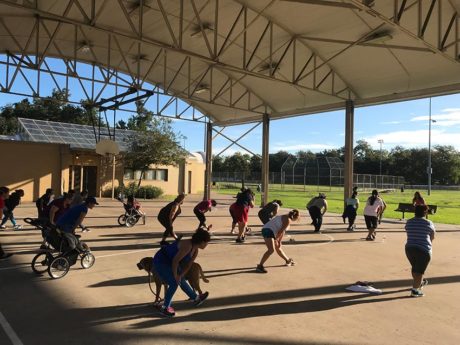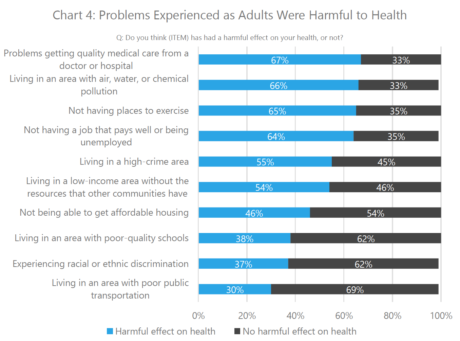
EHF’s survey finds that 57% of adults in Texas say that they think having good medical care isn’t sufficient to live a healthy life. Similar majorities of white and black Texans, people across different age groups, genders and political parties, and even those with chronic medical conditions share the same opinion.
“We know that 80% of what determines a person’s health doesn’t involve access to medical care, and these survey results show that Texans live with that reality every day,” said Elena Marks, EHF’s president and CEO. “These numbers should spark important conversations across the state on how we can focus on the non-medical, underlying causes of poor health that have nothing to do with going to a doctor or hospital. So many Texans face a range of social and economic conditions that almost conspire against their health. We have to change the conversation to improving health, not just health care.”
Non-Medical Conditions Play A Large Role In Overall Health
Texans agree that many non-medical factors (often referred to as social determinants of health) play a vital role in overall health. The vast majority of Texans say that living conditions such as good air quality and clean water (92%), community safety (76%) and housing quality (71%) are essential or very important to a person’s health.
The survey also found that socioeconomic circumstances rated high on Texans’ list of factors important to a healthy life. Seven in 10 adults (70%) consider income and 66% consider a person’s level of education as essential or very important to health. Moreover, researchers found that black and Hispanic Texans, as well as low-income adults were more likely to consider income and education more critical to a person’s health.
Large majorities of Texans also say eating healthy foods and exercising (92%), stress (85%), and social support (78%) are critical factors in determining if a person lives a healthy life.
Experiences With Some Non-Medical Problems Worsened Health
Texans have had first-hand experience with a wide range of non-medical factors that they said have been harmful to their health. Two-thirds of Texans (66%) who lived in an area with environmental pollution say that experience had a harmful effect in their health. Almost two thirds of adults who say they had problems having places to exercise (65%) or had employment or salary issues (64%) also say those problems worsened their health.

Texans cite other problems that had a damaging effect on their health including living in a high-crime area (55%), living in a low-income area (54%), and facing challenges with affordable housing (46%).
Access to Affordable Care Still Critical
Finally, while Texans say non-medical factors are critical to health, they also recognize that access to affordable medical care is an important piece of a person’s overall health puzzle. Texas has the highest number and percentage of people without health insurance in the country, so it’s no surprise that the survey finds that 83% of Texans say the cost of health care is a big or moderate problem and 77% say the same about not having health insurance. Two-thirds of Texans (67%) also said that problems getting quality medical care from a doctor or hospital had a harmful effect on their health.
In addition, 85% of Texans say a person’s access to affordable health care is essential or very important to health and 80% say the same about whether or not a person has health insurance.
However, those with the least access to doctors and hospitals were the most likely to say good medical care was enough to life a healthy life. More than half (54%) of non-elderly adults without health insurance, 64% of foreign-born Texans, and 48% low-income adults consider good medical care enough to be healthy.
“When you can’t afford to see a doctor or go to a clinic, you’re more likely to place a really high value on medical care,” Marks said. “While medical care alone isn’t enough to keep many Texans healthy, affordable comprehensive care is a key part of the health system.”
This report was released as EHF celebrates five years of actively working to improve community health in Texas. These findings are the first in a series of reports drawing on EHF’s survey of Texans’ views of social determinants of health. Future survey results will look at how Texans say state government, health insurance plans, and other parts of the health system should address non-medical factors that impact health in Texas.
Methodology
SSRS, an independent research company from Glen Mills, PA, conducted the Texans’ Views on Social Determinants of Health Survey on behalf of Episcopal Health Foundation by telephone from October 10 – November 19, 2019 among a random representative sample of 1,200 adults age 18 and older living in the state of Texas. Sampling, data collection, weighting and tabulation were managed by SSRS in close collaboration with Episcopal Health Foundation researchers.
The margin of sampling error for this study is plus or minus 4 percentage points for results based on the total sample. For results based on subgroups, the margin of sampling error may be higher.
To schedule an interview, contact Brian Sasser, EHF’s chief communications officer, at bsasser@episcopalhealth.org or 832-795-9404.